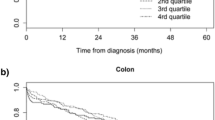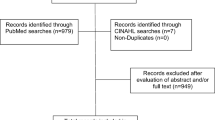Abstract
Purpose
The interval between symptom onset and therapy in patients with colorectal cancer was studied.
Methods
One hundred twenty three patients with colorectal cancer were included. Demography data, symptoms, consultations, and tumour stage were obtained by standardized questionnaires. Risk factors for delayed treatment were analysed.
Results
Eighty six patients suffered from colonic cancer. The total time between the first symptoms and therapy ranged from 13 to 442 days (mean, 148). Delay of surgical therapy was responsible for significantly higher tumour grades. Delayed start of therapy was found to be correlated to the type of cancer, socioeconomic status, marital status, and quality of first consultation (univariate analysis). On multivariate analyses, type of cancer, marital and socioeconomic status remained significantly associated with delayed treatment (all p values ≤ 0.001, r2 = 0.50).
Conclusions
The delay in treatment of colorectal cancer depends on socioeconomic status and family background. Achieving equity in colorectal cancer detection may require consideration of high-risk subgroups.

Similar content being viewed by others
References
Rim SH, Seeff L, Ahmed F, King JB, Coughlin SS (2009) Colorectal cancer incidence in the United States, 1999–2004: an updated analysis of data from the national program of cancer registries and the surveillance, epidemiology, and end results program. Cancer 115:1967–76
Brenner H, Hoffmeister M, Brenner G, Altenhofen L, Haug U (2009) Expected reduction of colorectal cancer incidence within 8 years after introduction of the German screening colonoscopy programme: estimates based on 1, 875, 708 screening colonoscopies. Eur J Cancer 45:2027–33
McArdle CS, Hole DJ (2002) Outcome following surgery for colorectal cancer: analysis by hospital after adjustment for case-mix and deprivation. Br J Cancer 86:331–5
Schiffmann L, Ozcan S, Schwarz F, Lange J, Prall F, Klar E (2008) Colorectal cancer in the elderly: surgical treatment and long-term survival. Int J Colorectal Dis 23:601–10
Merkel S, Klossek D, Gohl J, Papadopoulos T, Hohenberger W, Hermanek P (2009) Quality management in rectal carcinoma: what is feasible? Int J Colorectal Dis 24:931–42
Steinert R, Marusch F, Koch A, Ptok H, Reymond MA, Gastinger I (2005) Möglichkeitern der Qualitätsverbesserung bei der Therapie des Rektumkarzinoms. Zentralbl Chir 130:387–92
Taskila T, Wilson S, Damery S, Roalfe A, Redman V, Ismail T, Hobbs R (2009) Factors affecting attitudes toward colorectal cancer screening in the primary care population. Br J Cancer 101:250–5
Schoppmeyer K, Spieker H, Mössner J (2009) Failure of screening or failure to screen? The screening behavior of patients with colorectal cancer in the Leipzig area. Dtsch Ärztebl Int 106:195–201
Mitchell E, Macdonald S, Campbell NC, Weller D, Macleod U (2008) Influences on pre-hospital delay in the diagnosis of colorectal cancer: a systematic review. Br J Cancer 98:60–70
Robinson E, Mohilever J, Zidan J, Sapir D (1986) Colorectal cancer: incidence, delay in diagnosis and stage of disease. Eur J Cancer Clin Oncol 22:157–61
Frederiksen BL, Osler M, Harling H, Jorgensen T (2008) Social inequalities in stage at diagnosis of rectal but not in colonic cancer: a nationwide study. Br J Cancer 98:668–73
Turunen MJ, Peltokallio P (1982) Delay in the diagnosis of colorectal cancer. Ann Chir Gynaecol 71:277–82
Graffner H, Olsson SA (1986) Patient's and doctor's delay in carcinoma of the colon and rectum. J Surg Oncol 31:188–90
Holliday HW, Hardcastle JD (1979) Delay in diagnosis and treatment of symptomatic colorectal cancer. Lancet 1:309–11
Korsgaard M, Pedersen L, Sorensen HT, Laurberg S (2006) Reported symptoms, diagnostic delay and stage of colorectal cancer: a population-based study in Denmark. Colorectal Dis 8:688–95
MacArthur C, Smith A (1984) Factors associated with speed of diagnosis, referral, and treatment in colorectal cancer. J Epidemiol Community Health 38:122–6
Arbman G, Nilsson E, Storgren-Fordell V, Sjodahl R (1996) A short diagnostic delay is more important for rectal cancer than for colonic cancer. Eur J Surg 162:899–904
Carter S, Winslet M (1998) Delay in the presentation of colorectal carcinoma: a review of causation. Int J Colorectal Dis 13:27–31
Langenbach MR, Schmidt J, Neumann J, Zirngibl H (2003) Delay in treatment of colorectal cancer: multifactorial problem. World J Surg 27:304–8
Ristvedt SL, Birnbaum EH, Dietz DW, Fleshman JW, Kodner IJ, Read TE (2005) Delayed treatment for rectal cancer. Dis Colon Rectum 48:1736–41
Davies E, van der Molen B, Cranston A (2007) Using clinical audit, qualitative data from patients and feedback from general practitioners to decrease delay in the referral of suspected colorectal cancer. J Eval Clin Pract 13:310–7
Ramos M, Esteva M, Cabeza E, Llobera J, Ruiz A (2008) Lack of association between diagnostic and therapeutic delay and stage of colorectal cancer. Eur J Cancer 44:510–21
Ramos M, Esteva M, Cabeza E, Campillo C, Llobera J, Aguilo A (2007) Relationship of diagnostic and therapeutic delay with survival in colorectal cancer: a review. Eur J Cancer 43:2467–78
Korsgaard M, Pedersen L, Sorensen HT, Laurberg S (2006) Delay of treatment is associated with advanced stage of rectal cancer but not of colon cancer. Cancer Detect Prev 30:341–6
Rupassara KS, Ponnusamy S, Withanage N, Milewski PJ (2006) A paradox explained? Patients with delayed diagnosis of symptomatic colorectal cancer have good prognosis. Colorectal Dis 8:423–9
Gomez-Dominguez E, Trapero-Marugan M, del Pozo AJ, Cantero J, Gisbert JP, Mate J (2006) The colorectal carcinoma prognosis factors. Significance of diagnosis delay. Rev Esp Enferm Dig 98:322–9
Khattak I, Eardley NJ, Rooney PS (2006) Colorectal cancer—a prospective evaluation of symptom duration and GP referral patterns in an inner city teaching hospital. Colorectal Dis 8:518–21
Roncoroni L, Pietra N, Violi V, Sarli L, Choua O, Peracchia A (1999) Delay in the diagnosis and outcome of colorectal cancer: a prospective study. Eur J Surg Oncol 25:173–8
Harris GJC, Simson JNL (1998) Causes of late diagnosis in cases of colorectal cancer seen in a district general hospital over a 2-year period. Ann R Coll Surg Engl 80:246–8
Taylor C, Schultz SE, Paszat LF, Bondy S, Rabeneck L (2007) Prevalence of screening in patients newly diagnosed with colorectal cancer in Ontario. Can J Gastroenterol 21:805–8
Frederiksen BL, Osler M, Harling H, Ladelund S, Jorgensen T (2009) Do patient characteristics, disease, or treatment explain social inequality in survival from colorectal cancer? Soc Sci Med 6(7):1107–1115
Conflict of interest
The authors declare that they have no conflict of interest. This study was funded in part by the German Ministry of Education and Research (CHIR-Net, grant 01GH0605). Data were presented at the 13th Congress of the Surgical Research Section of the German Surgical Society held in Munich Germany on September 10–12, 2009.
Author information
Authors and Affiliations
Corresponding author
Additional information
Authors' contributions
Study conception and design: Langenbach, Sauerland, Kroebel and Zirngibl Acquisition of data: Langenbach and KroebelAnalysis and interpretation of data: Langenbach, Sauerland, Kroebel and ZirngiblDrafting of manuscript: Langenbach and SauerlandCritical revision of manuscript: Langenbach, Sauerland and Zirngibl
Rights and permissions
About this article
Cite this article
Langenbach, M.R., Sauerland, S., Kröbel, KW. et al. Why so late?!—delay in treatment of colorectal cancer is socially determined. Langenbecks Arch Surg 395, 1017–1024 (2010). https://doi.org/10.1007/s00423-010-0664-8
Received:
Accepted:
Published:
Issue Date:
DOI: https://doi.org/10.1007/s00423-010-0664-8




